The Essentials Of Pool Filtration: Maintenance And Upgrade Tips
The joy of owning a pool often lies in its crystal-clear waters, inviting you for a refreshing dip on a hot day. However, maintaining that level of clarity requires more than just a splash of chlorine. A robust pool filtration system is the backbone of pool maintenance, ensuring that your water stays clean, safe, and ready for use. This post will guide you through the essentials of pool filtration systems, from understanding different types and recognising signs of failure to mastering maintenance tips and exploring upgrade options.
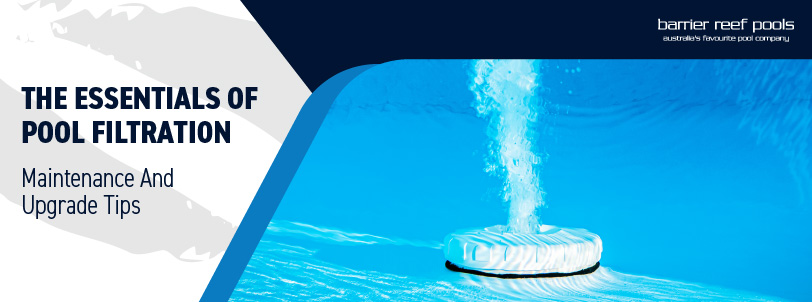
Understanding Types of Pool Filters
Choosing the right pool filter is crucial for effective water filtration. There are three main types to consider:
Sand Filters
Sand filters are common due to their simplicity and effectiveness. They push pool water through sand, trapping debris and dirt. Suitable for medium to large pools, they are easy to maintain but require periodic backwashing.
Cartridge Filters
Cartridge filters use a replaceable cartridge to trap debris. They filter out smaller particles than sand filters and are ideal for small to medium-sized pools. Maintenance is less frequent, involving regular removal and hosing down of the cartridge.
Diatomaceous Earth (DE) Filters
DE filters offer the finest filtration, trapping particles as small as 2 microns. They use fossilised algae powder to coat grids and capture tiny debris. Ideal for large pools needing top water clarity, they require more maintenance, including regular backwashing and DE powder replenishment.
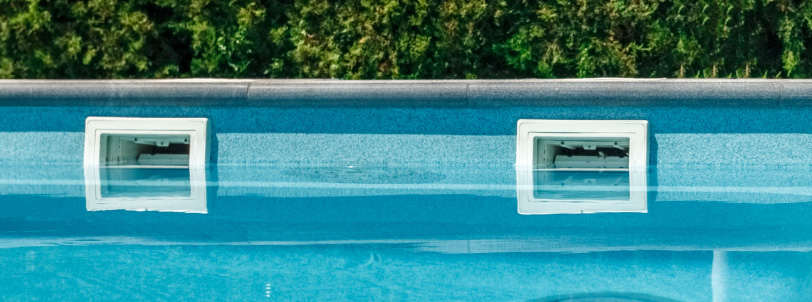
Recognising Signs of a Failing Pool Filter
A failing pool filter can lead to murky water, increased chemical usage, and potential health hazards. Ensuring your pool filter is functioning correctly is crucial for maintaining clean and safe swimming water. Here are some signs your filter may need attention:
Increased Water Cloudiness
If your pool water becomes cloudy despite regular chemical treatments, it may indicate that your filter is not functioning correctly. Cloudiness can result from a build-up of debris that the filter is no longer able to trap effectively. This not only makes your pool look uninviting but can also create an environment conducive to bacterial growth, posing health risks to swimmers.
Higher Pressure Readings
Check your filter’s pressure gauge regularly. A consistently high reading suggests that the filter is clogged and needs cleaning. Ignoring this issue can reduce water circulation and strain your pump, leading to increased wear and tear. Over time, it could even cause pump failure, which is a costly repair or replacement.
Visible Debris in the Pool
When you notice more leaves, dirt, and other debris floating in your pool, it’s a clear sign that your filter isn’t doing its job. This can result from a damaged filter element or clogged media needing replacement or cleaning. Debris not properly filtered out can also settle at the bottom of the pool, making it slippery and unsafe, as well as creating a breeding ground for algae.
Unusual Noises from the Filter System
A well-functioning filter system should operate relatively quietly. If you start hearing unusual noises such as grinding, banging, or loud gurgling, it could indicate a mechanical issue within the filter or pump. These noises often signal that the filter or pump is working harder than it should, requiring immediate attention to prevent further damage.
Frequent Need to Add More Chemicals
If you find yourself having to add more chemicals than usual to maintain water balance, your filter may not be removing contaminants effectively. This inefficiency means more organic matter is present in the water, which reacts with chlorine and other chemicals, resulting in higher consumption rates. Not only does this increase maintenance costs, but it also makes swimming less enjoyable due to the higher chemical content.
Regular maintenance and timely attention to your pool filter can significantly enhance the longevity and enjoyment of your swimming pool. Keep an eye on these signs and take action promptly to ensure crystal-clear, safe water for all swimmers.
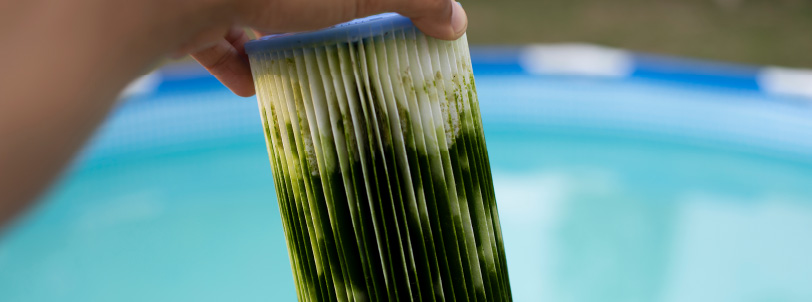
Maintenance Tips for Pool Filters
Proper maintenance ensures your pool filter performs at its best, extending its lifespan and keeping your pool water pristine.
Sand Filter Maintenance
For sand filters, backwashing is essential. This process involves reversing the water flow to flush out trapped debris. Aim to backwash your sand filter every two weeks or when the pressure gauge rises 8-10 psi above normal. Additionally, replace the sand every 3-5 years to maintain optimal filtration.
Cartridge Filter Maintenance
Cartridge filters should be cleaned at least once a month. Remove the cartridge and use a garden hose to wash away dirt and debris. For a deeper clean, soak the cartridge in a filter cleaning solution overnight. Replace the cartridge every 1-2 years or when you notice signs of wear and tear.
DE Filter Maintenance
DE filters require regular backwashing and DE powder replenishment. Backwash the filter when the pressure gauge indicates a 20% increase in pressure. After backwashing, add fresh DE powder to the skimmer to coat the grids anew. Inspect the grids annually for damage and replace them if needed.
Upgrading Your Pool Filtration System
Upgrading your pool filtration system can bring numerous benefits, from improved water quality to reduced energy costs. Here are some modern upgrades to consider:
Saltwater Chlorinators
Saltwater chlorinators convert salt into chlorine, providing a consistent and gentler sanitisation method. This system reduces the need for chemical chlorine, making the water softer and less irritating to the skin and eyes. It also lowers maintenance efforts and costs in the long run.
Variable-Speed Pumps
Variable-speed pumps offer significant energy savings by adjusting the pump speed to match the pool’s filtration needs. Unlike single-speed pumps that run at full power constantly, variable-speed pumps operate at lower speeds for regular filtration and higher speeds for tasks like vacuuming and backwashing. This flexibility not only reduces energy consumption but also extends the life of the pump.
Advanced Filtration Media
Upgrading to advanced filtration media, such as Zeolite or glass, can enhance your filter’s performance. These materials offer superior filtration compared to traditional sand, capturing finer particles and requiring less frequent backwashing. They can be used in both sand and DE filters, providing a versatile upgrade option.
Maintaining a clean and safe pool requires a reliable and well-maintained filtration system. By understanding the different types of filters, recognising signs of failure, and following proper maintenance guidelines, you can ensure your pool remains a refreshing oasis. Upgrading to modern filtration options like saltwater chlorinators and variable-speed pumps can further enhance your pool’s efficiency and water quality. Stay proactive in your pool care, and you’ll enjoy crystal-clear waters all season long. Remember, a well-maintained pool is a happy pool!
The Essentials Of Pool Filtration: Maintenance And Upgrade Tips
The joy of owning a pool often lies in its crystal-clear waters, inviting you for a refreshing dip on a hot day. However, maintaining that level of clarity requires more than just a splash of chlorine. A robust pool filtration system is the backbone of pool maintenance, ensuring that your water stays clean, safe, and ready for use. This post will guide you through the essentials of pool filtration systems, from understanding different types and recognising signs of failure to mastering maintenance tips and exploring upgrade options.
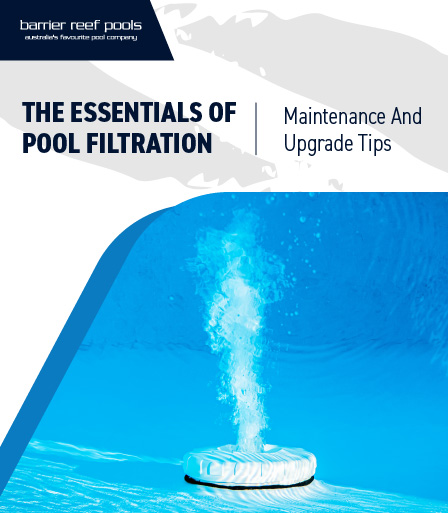
Understanding Types of Pool Filters
Choosing the right pool filter is crucial for effective water filtration. There are three main types to consider:
Sand Filters
Sand filters are common due to their simplicity and effectiveness. They push pool water through sand, trapping debris and dirt. Suitable for medium to large pools, they are easy to maintain but require periodic backwashing.
Cartridge Filters
Cartridge filters use a replaceable cartridge to trap debris. They filter out smaller particles than sand filters and are ideal for small to medium-sized pools. Maintenance is less frequent, involving regular removal and hosing down of the cartridge.
Diatomaceous Earth (DE) Filters
DE filters offer the finest filtration, trapping particles as small as 2 microns. They use fossilised algae powder to coat grids and capture tiny debris. Ideal for large pools needing top water clarity, they require more maintenance, including regular backwashing and DE powder replenishment.
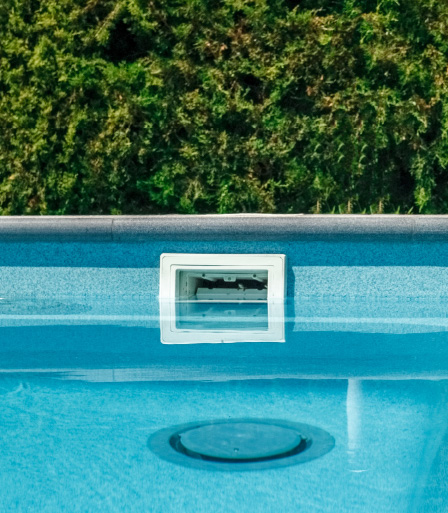
Recognising Signs of a Failing Pool Filter
A failing pool filter can lead to murky water, increased chemical usage, and potential health hazards. Ensuring your pool filter is functioning correctly is crucial for maintaining clean and safe swimming water. Here are some signs your filter may need attention:
Increased Water Cloudiness
If your pool water becomes cloudy despite regular chemical treatments, it may indicate that your filter is not functioning correctly. Cloudiness can result from a build-up of debris that the filter is no longer able to trap effectively. This not only makes your pool look uninviting but can also create an environment conducive to bacterial growth, posing health risks to swimmers.
Higher Pressure Readings
Check your filter’s pressure gauge regularly. A consistently high reading suggests that the filter is clogged and needs cleaning. Ignoring this issue can reduce water circulation and strain your pump, leading to increased wear and tear. Over time, it could even cause pump failure, which is a costly repair or replacement.
Visible Debris in the Pool
When you notice more leaves, dirt, and other debris floating in your pool, it’s a clear sign that your filter isn’t doing its job. This can result from a damaged filter element or clogged media needing replacement or cleaning. Debris not properly filtered out can also settle at the bottom of the pool, making it slippery and unsafe, as well as creating a breeding ground for algae.
Unusual Noises from the Filter System
A well-functioning filter system should operate relatively quietly. If you start hearing unusual noises such as grinding, banging, or loud gurgling, it could indicate a mechanical issue within the filter or pump. These noises often signal that the filter or pump is working harder than it should, requiring immediate attention to prevent further damage.
Frequent Need to Add More Chemicals
If you find yourself having to add more chemicals than usual to maintain water balance, your filter may not be removing contaminants effectively. This inefficiency means more organic matter is present in the water, which reacts with chlorine and other chemicals, resulting in higher consumption rates. Not only does this increase maintenance costs, but it also makes swimming less enjoyable due to the higher chemical content.
Regular maintenance and timely attention to your pool filter can significantly enhance the longevity and enjoyment of your swimming pool. Keep an eye on these signs and take action promptly to ensure crystal-clear, safe water for all swimmers.
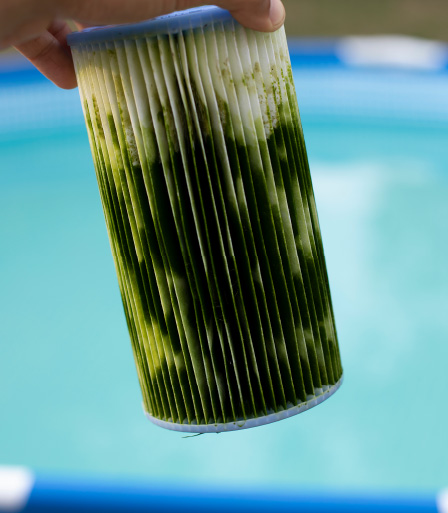
Maintenance Tips for Pool Filters
Proper maintenance ensures your pool filter performs at its best, extending its lifespan and keeping your pool water pristine.
Sand Filter Maintenance
For sand filters, backwashing is essential. This process involves reversing the water flow to flush out trapped debris. Aim to backwash your sand filter every two weeks or when the pressure gauge rises 8-10 psi above normal. Additionally, replace the sand every 3-5 years to maintain optimal filtration.
Cartridge Filter Maintenance
Cartridge filters should be cleaned at least once a month. Remove the cartridge and use a garden hose to wash away dirt and debris. For a deeper clean, soak the cartridge in a filter cleaning solution overnight. Replace the cartridge every 1-2 years or when you notice signs of wear and tear.
DE Filter Maintenance
DE filters require regular backwashing and DE powder replenishment. Backwash the filter when the pressure gauge indicates a 20% increase in pressure. After backwashing, add fresh DE powder to the skimmer to coat the grids anew. Inspect the grids annually for damage and replace them if needed.
Upgrading Your Pool Filtration System
Upgrading your pool filtration system can bring numerous benefits, from improved water quality to reduced energy costs. Here are some modern upgrades to consider:
Saltwater Chlorinators
Saltwater chlorinators convert salt into chlorine, providing a consistent and gentler sanitisation method. This system reduces the need for chemical chlorine, making the water softer and less irritating to the skin and eyes. It also lowers maintenance efforts and costs in the long run.
Variable-Speed Pumps
Variable-speed pumps offer significant energy savings by adjusting the pump speed to match the pool’s filtration needs. Unlike single-speed pumps that run at full power constantly, variable-speed pumps operate at lower speeds for regular filtration and higher speeds for tasks like vacuuming and backwashing. This flexibility not only reduces energy consumption but also extends the life of the pump.
Advanced Filtration Media
Upgrading to advanced filtration media, such as Zeolite or glass, can enhance your filter’s performance. These materials offer superior filtration compared to traditional sand, capturing finer particles and requiring less frequent backwashing. They can be used in both sand and DE filters, providing a versatile upgrade option.
Maintaining a clean and safe pool requires a reliable and well-maintained filtration system. By understanding the different types of filters, recognising signs of failure, and following proper maintenance guidelines, you can ensure your pool remains a refreshing oasis. Upgrading to modern filtration options like saltwater chlorinators and variable-speed pumps can further enhance your pool’s efficiency and water quality. Stay proactive in your pool care, and you’ll enjoy crystal-clear waters all season long. Remember, a well-maintained pool is a happy pool!


